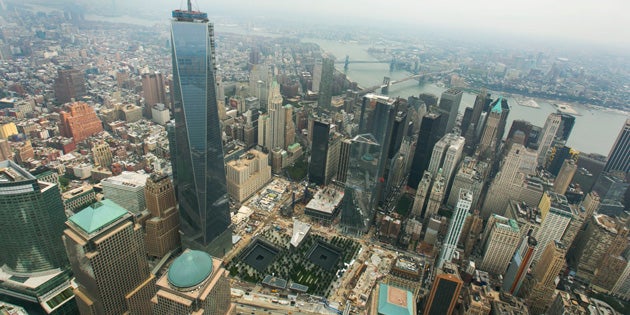When College of Charleston English professor Susan Farrell offered two courses examining post-9/11 American literature in spring 2014, she wasn’t sure how her students would respond to the subject matter.
The two courses – a graduate seminar and a 300-level undergraduate course – examined multiple artistic and cultural responses to 9/11, including novels, poems, memoirs, non-fiction, film, music and sculpture.
“This was a hard class to teach in many ways because the events were so traumatic and so recent,” Farrell says. “I was surprised to find that many of my students were actually from the Northeast – from New York, Connecticut and New Jersey specifically. Many of the students were drawn to the class because they knew people directly affected by the attacks, even people who had died in 9/11.”
One book in particular, Jonathan Safran Foer’s 2005 novel “Extremely Loud and Incredibly Close,” resonated with many students. The novel is narrated by a 9-year-old boy whose father died in the 9/11 terrorist attacks on the World Trade Center.
At the time of the attacks, many of Farrell’s undergraduate students were about the same age as the book’s protagonist. “So they were very interested in seeing the attacks described and made sense of by a child who lost his father in the twin towers,” she says.
In preparation for the courses, Farrell read dozens of novels and non-fiction books dealing with 9/11. While many works reference the attacks peripherally, Farrell says the most thoughtful and compelling works are those that confront the tragedy directly.
In teaching 9/11, she says it is important to select works that offer a variety of perspectives – from victims who lost family members in the attacks to works that show the after-effects of 9/11 on Arab Americans and Muslim Americans, to works that try to understand the terrorist mindset.
Here, Farrell recommends 5 Books That Confront the Tragedy of 9/11:
1. “The 9/11 Commission Report” (2004)
This is the official report put out by the government about what happened on 9/11 and what led up to the attacks. Surprisingly well-written and compelling for a government document, this book details exactly what happened on the planes to the best of our knowledge; it describes the emergency response to the fall of the towers and speculates about why there was such a large loss of life; it examines the formation of Al Qaeda and the training of the operatives; and it makes suggestions to ensure that such attacks don’t happen again.
2. “Extremely Loud and Incredibly Close” by Jonathan Safran Foer (2005)
A moving book told in the voice of a 9-year-old boy, Oskar Schell, whose father dies in the twin towers. Oskar’s story alternates with the story of his grandparents, who were Germans that experienced the Allied bombing of Dresden in World War II. The novel shows the affects of trauma, how traumatic loss can tear families apart, but also the ways that people try to survive great loss.
“I first became interested in teaching about 9/11 literature through reading and teaching this book in my Contemporary American Fiction class in 2005,” Farrell says. “In fact, one of the students in my class became very interested in 9/11 literature as a result of reading Foer’s book and went on to write her bachelor’s essay on post 9/11 fiction. I co-supervised this project with Scott Peeples in the English Department.”
In the video below, Jonathan Safran Foer speaks at the College in 2012 about his book “Eating Animals.”
3. “The Zero” by Jess Walter (2006)
The novel is a dark satire that explores American commercialization and media exploitation of the events of 9/11 as well as the rise of the homeland security apparatus.
“I like this book because it’s so different than most other things written about 9/11,” Farrell says. “It’s very funny and cynical while making readers think about the after-effects of the attacks.”
4. “Falling Man” by Don DeLillo (2007)
A novel that explores the effects of the attack on a New York City couple. The husband escapes from the towers, but the couples’ marriage begins to disintegrate after 9/11. DeLillo also questions the relationship between art and tragedy. The novel’s title refers to a performance artist known as The Falling Man who stages falls in unexpected places around the city that evoke the people that either jumped or fell from the towers, forcing New Yorkers to continuously confront their worst fears.
5. “Once in a Promised Land” by Laila Halaby (2008)
This novel focuses on a Muslim, Arab-American couple living in Phoenix, Arizona. It depicts how anti-Muslim and anti-Arab sentiment following the terrorist attacks affects and alters their lives.






